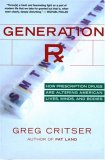Summary | Excerpt | Reviews | Beyond the Book | Readalikes | Genres & Themes | Author Bio

Critics' Opinion:
Readers' Opinion:
First Published:
Oct 2005, 288 pages
Paperback:
Jan 2007, 320 pages
 Book Reviewed by:
Book Reviewed by:
BookBrowse Review Team
Buy This Book
Contents
Acknowledgments
Introduction
1. UNBOUND
The Strange and Very American Liberation of Big Pharma
2. WE LOVE IT!
How the New Pharma Used Its New Muscle to Create a New . . . You
3. THE FULL PRICE
What Living in Pharma's World Means for Our Bodies
4. THE END OF THE GREAT BUFFER?
Why We Are More Vulnerable
5. INDEPENDENCE FOR GENERATION RX
What Can Be Done
A Brief Guide to the Art of Taking Prescription Drugs
Notes
Index
Unbound
The Strange and Very American Liberation
of Big Pharma
THE MAN IN THE ARENA: WHY PHARMACEUTICAL
COMPANIES
BECAME SO AGGRESSIVE
In the world of bureaucratic Washington,
D.C., few if any possess the
gravitas and smarts to get away with
quoting Teddy Roosevelt. Lewis Engman, Richard Nixon's 1973 appointee
as chairman of the powerful
Federal Trade Commission (FTC), was one
of the few. A Midwesterner with
traditional Republican inclinations,
Engman had "the gift," as one friend later
put it — people simply wanted to be
around him. He was a handsome man,
with a broad brow and piercing dark
eyes, and he was a social creature,
stylishly dressed and coiffed and
noticeable on the D.C. cocktail circuit,
where he could be seen in the company of
many of the president's closest
advisers. Engman was a personable, if
tightly wound, man as well,
comfortable with business types and
staff typists alike; when a young FTC
appointee named Elizabeth Hanford (later
Dole) had a minor accident and
ended up in the emergency room on the
day she was to be installed,
Engman took his entire staff over to the
hospital and swore her in while she
was still in bed.
More importantly in a town of fiercely
guarded opinions and
fiefdoms, Lew Engman could take the heat
of debate. He seemed to revel in
it. Often he intentionally recruited
lawyers with whom he did not agree. "The
notion," a former staffer recalls, "was
that the tension would produce the best
resolution." That didn't mean Engman was
thwarted very often; yes, he could
be imperious and even arrogant, but "he
was so personable and passionate
that you wanted to agree with the guy."
Frustrated with the slow pace of
getting anything done in D.C.,
Engman loved to invoke TR's famous "Man
in the Arena" speech. "It is not the
critic who counts; not the man who
points out how the strong man stumbles
or where the doer of deeds could have
done better," he would quote, his brow
furrowing. "The credit belongs to the
man who is actually in the arena, whose
face is marred by dust and sweat and
blood, who strives valiantly, who errs
and comes up short again and again, but
who knows great enthusiasms . . .
so that his place shall never be with
those cold and timid souls who knew
neither victory nor defeat."
It was an appropriate mission statement
for a young man charged
with running the FTC, which oversaw the
business of the world's most
powerful, if at the time troubled,
economy. The FTC itself had grown
increasingly controversial. For decades
the commission had operated
somewhat like a European or Japanese
finance ministry, not simply policing
industry's outright frauds and cons, but
also regulating competition itself. The
agencies under its purview, from the
Civil Aviation Board (CAB) to the
Interstate Commerce Commission (ICC),
were so cozy with their respective
industries that it was all but
impossible for an upstart entrepreneur to
compete. Traditionally the FTC chairman,
in a tacit admission of the powerful
regional political interests that had
created that coziness, remained mute on
the situation. "The policy was never to
criticize another government agency,"
recalls Art Amolsch, who worked for
Engman at the time and went on to
become the foremost observer of the
agency. "That's why the FTC was
always known as the Old Lady of
Pennsylvania Avenue. It was averse to
almost any change and inclined to say no
to anyone who dared suggest
otherwise."
Copyright © 2005 by Greg Critser. Reprinted by permission of Houghton Mifflin Company.





The Flower Sisters
by Michelle Collins Anderson
From the new Fannie Flagg of the Ozarks, a richly-woven story of family, forgiveness, and reinvention.

The House on Biscayne Bay
by Chanel Cleeton
As death stalks a gothic mansion in Miami, the lives of two women intertwine as the past and present collide.

The Funeral Cryer by Wenyan Lu
Debut novelist Wenyan Lu brings us this witty yet profound story about one woman's midlife reawakening in contemporary rural China.
Your guide toexceptional books
BookBrowse seeks out and recommends the best in contemporary fiction and nonfiction—books that not only engage and entertain but also deepen our understanding of ourselves and the world around us.